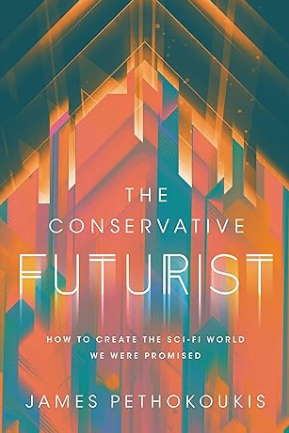The Conservative Futurist: How to Create the Sci-Fi World We Were Promised
by James Pethokoukis (Center Street, $37, 327 pages)
Paul Tuns, Review:
 James Pethokoukis, a policy analyst at the American Enterprise Institute, has written a call-to-arms for conservatives and policymakers to embrace almost limitless innovation to create the economic growth that will deliver the human flourishing that techno-optimists have been predicting for decades. Despite shortcomings, The Conservative Futurist is an important book.
James Pethokoukis, a policy analyst at the American Enterprise Institute, has written a call-to-arms for conservatives and policymakers to embrace almost limitless innovation to create the economic growth that will deliver the human flourishing that techno-optimists have been predicting for decades. Despite shortcomings, The Conservative Futurist is an important book.
Pethokoukis is correct to point out that human populations are better off with innovation and growth, and that too often the precautionary principle of “better safe than sorry” prevents progress that makes life more convenient and bearable for untold millions. Risk aversion is important but can be taken too far; would governments have permitted automobiles on the roads if they knew that eventually they would travel 120 km/hr and take the lives of millions of people? Probably not. Yet reliable travel by cars and transport trucks has made life unquestionably better for nearly everyone (climate doomers notwithstanding).
The author is also correct to point out that doomsayers have been proven wrong time and time again, noting the infamous example of Paul Ehrlich’s incessant predictions of imminent demise of humanity due to overpopulation stripping the Earth’s capacity to support a burgeoning population. In fact, living standards have increased globally while global population has increased by billions.
Countering both the anti-capitalist left and right, Pethokoukis demolishes numerous economic myths (worker wages have been spiraling downward for decades, inequality has increased, capitalism only cares about consumerism).
So far, so good. Where Pethokoukis ultimately (and admittedly) comes up short is in considering the potential harms of numerous innovations that we may be on the cusp of achieving, most notably artificial general intelligence and genetic therapies: “I’ve not spent much time exploring how emerging technologies might make life worse.” Pethokoukis repeatedly reminds readers that there are tradeoffs in embracing or denying new technologies, but he is uninterested in considering the downside of pursuing and embracing numerous new innovations. It is hard to consider the tradeoffs when part of the ledger is missing.
Why, ultimately, does the author of this libertarian vision of the future describe himself as conservative? One is the American conservative tradition – at least until recently – of supporting free markets, although Pethokoukis. More importantly, though, he says that conservatives recognize their “deep obligation to future generations.” Funny, then, that he doesn’t consider the potential threats to future generations that some innovations may present to humanity.
Paul Tuns is editor of The Interim.




